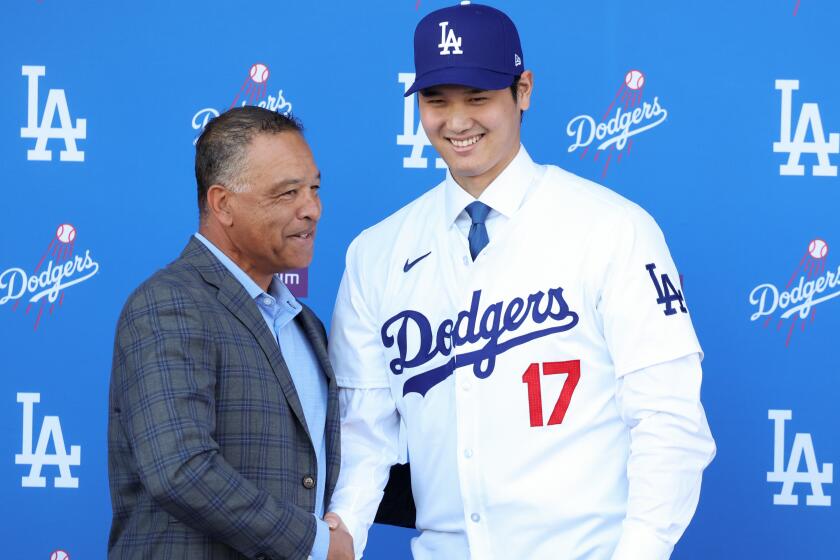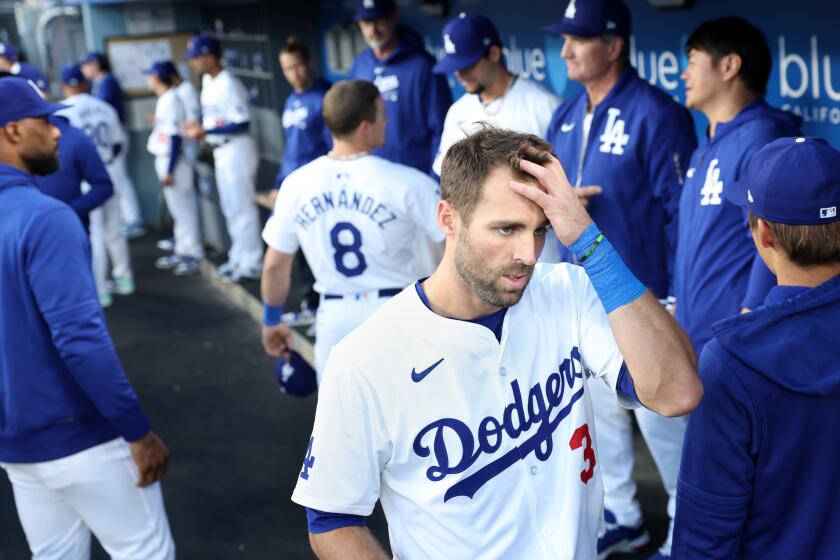The McCourt trial would make for good viewing at Dodger Stadium
Day 3 of the Dodgers trial, and it’s just me and Frank standing in the courthouse hallway after he’s spent the entire day on the witness stand, and the first words he says to me are, “I just know we lost.”
It turns out he’s talking about the Dodgers game Wednesday and not the trial, a bummer as you might imagine for fans.
I’m surprised he knows the outcome because when he goes into court at 1:30, his noon lunch break beginning just as the game does, he says in answer to my question he has no idea how the Dodgers are doing.
A court official standing nearby says, “I bet he knows the attendance.”
Best guess is his attorney, Stephen Susman, who has sent more signs to his client on the witness stand than Larry Bowa sends in an entire season, gave McCourt the thumbs down at some point.
And that reminds me, how come the Dodgers haven’t put highlights of the trial up on DodgerVision before games with the Phillies — Nancy Bea on the organ.
Day 3 is tailor-made for a video package, Nancy Bea pounding the keyboard, the clock hitting 9:30 a.m., the judge takes his seat, Frank stands ready to take the stand and there’s no Jamie.
She’s late for her own trial, a chance for Frank to have his people run a picture of Georgia Frontiere up on the scoreboard, the camera lingering on an empty chair in the courtroom, Nancy Bea going to a ticking clock beat.
It would have brought down the house, and considering the way the game went, maybe the highlight of the afternoon in Dodger Stadium.
Jamie finally shows, no cameras allowed in the courtroom, so I will tell you she’s wearing an off-white ensemble over a solid white top, the back of her jacket and skirt, and keep in mind I’m a paid observer, featuring fine embroidery.
David Boies, Jaime’s attorney and known for his “evisceration of Bill Gates on behalf of the Department of Justice” according to the media in a previous trial, now faces Frank, who if asked, could probably not remember what he ate for breakfast.
The media, who haven’t spent a lot of time being put off by McCourt, think he appears nervous. But I’m not sure McCourt has ever appeared comfortable, his blinking eyes, stiff demeanor and jaw flexing exercises appearing when all he has to say is “hi.”
Boies displays a document indicating McCourt’s net worth in 2004 was more than $381 million, while Jamie’s assets totaled an estimated $75 million. The attorney wants to know if it would be fair in a marriage property agreement for McCourt to have five times the wealth of his wife, McCourt doing the math in his head and quibbling whether it was five times the amount.
The judge begins coughing, excited no doubt at maybe coming down with something and being unable to sit through the rest of this.
What this trial needs is Denny Crane.
Testimony turns to a copy of the Dodgers’ business plan to win Major League Baseball approval when the McCourts were trying to buy the team.
McCourt says he never saw the business plan, though, which includes the Dodgers’ thinking on naming rights for Dodger Stadium once he took over.
Paragraph 2.1.3 in the document reads, “A well thought out naming rights deal presented in this context (the economic demands of professional sports in the 21st century) will be accepted by the Los Angeles market.”
He probably also thought he was going to be accepted by the Los Angeles market, and how did that go?
Jamie’s lawyers seem unanimous in their belief no matter how this all turns out, the Dodgers will have to be sold. I’m told there’s no cheering allowed in the courthouse.
As the trial goes on, every time McCourt mentions he’s been in a meeting, Boies wants to know how long it was. McCourt can never remember.
Boies wants to know if it was 10 minutes. McCourt can’t remember. Was it 30? He can’t remember. “That doesn’t mean it wasn’t 30,” says Boies, and then he wants to know where it was.
A cellphone goes off less than 30 minutes after the judge has told everyone he will essentially have them shot if such a thing should happen — people now doing anything to get out of the room.
Jamie’s attorney reads from something that has Frank telling everyone only Jamie and Mr. Fuller, the bodyguard who took his job so seriously, considered Jamie an owner of the team.
The attorney shows document after document, including applications for loans signed by both Frank and Jamie that have Jamie’s occupation listed as owner.
While that continues to be debated, it’s obvious who was boss, Frank telling everyone, “I had Mrs. McCourt’s permission to use $15 million for business” after the two took out a $30-million line of credit.
The talk turns to the marriage property agreement, and who wins big. I know this, Plaschke is in Honolulu and I’ll be on my way to Manhattan. Kansas. I know something about losing big.
There are three signed copies of the property agreement that have the Dodgers listed as only Frank’s personal property, and there are three signed copies that have the Dodgers belonging to both of them as community property. It’s about a $300- to $400-million swing.
Frank says he didn’t read the documents he signed, and everyone was mocking Jamie, most notably Frank’s attorneys — for doing the same thing. As you can see now, they had a lot in common.
None of this dirty laundry really matters if not for the fact whoever owns the Dodgers is kind of a big deal. But the way this team is falling apart, the present owner isn’t paying any attention.
I take that back. He knew they lost Wednesday.
t.j.simers@latimes.com
More to Read
Are you a true-blue fan?
Get our Dodgers Dugout newsletter for insights, news and much more.
You may occasionally receive promotional content from the Los Angeles Times.






